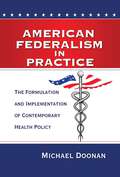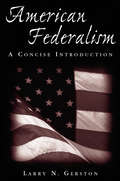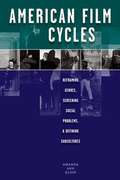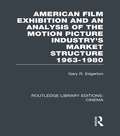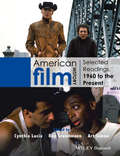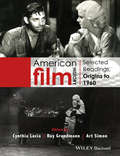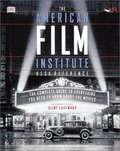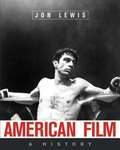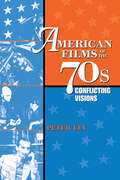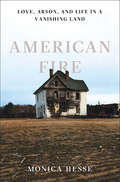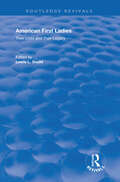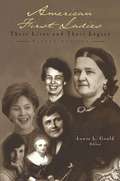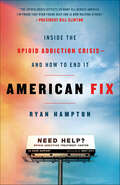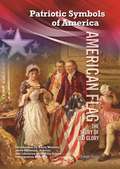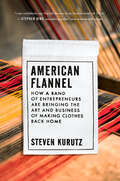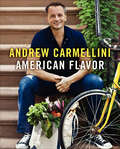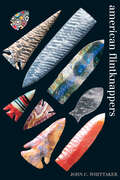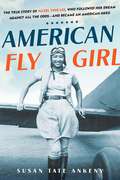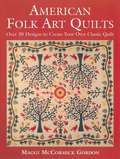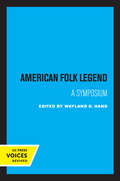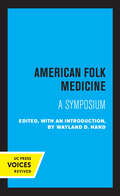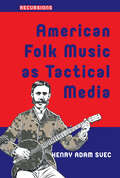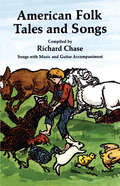- Table View
- List View
American Federalism in Practice
by Michael DoonanAmerican Federalism in Practice is an original and important contribution to our understanding of contemporary health policy. It also illustrates how contentious public policy is debated, formulated, and implemented in today's overheated political environment.Health care reform is perhaps the most divisive public policy issue facing the United States today. Michael Doonan provides a unique perspective on health policy in explaining how intergovernmental relations shape public policy. He tracks federal-state relations through the creation, formulation, and implementation of three of the most important health policy initiatives since the Great Society: the State Children's Health Insurance Program (CHIP) and the Health Insurance Portability and Accountability Act (HIPAA), both passed by the U.S. Congress, and the Massachusetts health care reform program as it was developed and implemented under federal government waiver authority. He applies lessons learned from these cases to implementation of the Affordable Care Act."Health policymaking is entangled in a complex web of shared, overlapping, and/or competing power relationships among different levels of government," the author notes. Understanding federal-state interactions, the ways in which they vary, and the reasons for such variation is essential to grasping the ultimate impact of federalism on programs and policy. Doonan reveals how federalism can shift as the sausage of public policy is made while providing a new framework for comprehending one of the most polarizing debates of our time.
American Federalism in Practice: The Formulation and Implementation of Contemporary Health Policy
by Michael Doonan"American Federalism in Practice" is a major contribution to our understanding of contemporary health policy in America. Always an important topic, the issue holds special currency today given the prominence of health care in todays political and economic landscape. Michael Doonan provides a unique perspective on American federalism and U. S. health policy in explaining how intergovernmental relations shape public policy in health as well as other critical areas. Doonan tracks federal-state relations through the creation, formulation, and implementation of three of the most important health policy initiatives since the Great Society: the Childrens Health Insurance Program (CHIP) and the Health Insurance Portability and Accountability Act (HIPAA), both developed in Congress, and the Massachusetts health care reform program as it was developed and implemented under federal government waiver authority. Massachusetts, though not without having to face challenges, actually succeeded in lowering its uninsured rate to below two percent. Success and failure of these three programs can be traced in large part to a balance between state flexibility and accountability to meet program goals. Achieving that balance is not easy, of course, but lessons learned from previous successes --and failures --in structuring intergovernmental relations offer unique insights into national health reform and contemporary public policy. Doonan reveals how federalism can shift as the sausage of public policy is made, providing a previously missing link between federalism theory and practice. His work should change the way people think about federalism in a policy context while providing a new and useful framework through which we can view, and hopefully comprehend, some of the most important and polarizing policy debates of our time.
American Federalism: A Concise Introduction
by Larry N. GerstonUnderstanding federalism - the form of political organization that unites separate polities within an overarching political system so that all maintain their political integrity - is central to the study of democratic government in the United States. Yet, many political scientists treat federalism as a set of abstract principles or a maze of budgetary transfers with little connection to real political life. This concise and engaging book boils the discussion down to its essence: federalism is about power, specifically the tug for power among and within the various levels of government. Author Larry N. Gerston examines the historical and philosophical underpinnings of federalism; the various "change events" that have been involved in defining America's unique set of federal principles over time; and the vertical, horizontal, and international dimensions of federalism in the United States today. The result is a book examining the ways in which institutional political power is both diffused and concentrated in the United States.
American Film Cycles
by Amanda Ann KleinA series of movies that share images, characters, settings, plots, or themes, film cycles have been an industrial strategy since the beginning of cinema. While some have viewed them as “subgenres,” mini-genres, or nascent film genres, Amanda Ann Klein argues that film cycles are an entity in their own right and a subject worthy of their own study. She posits that film cycles retain the marks of their historical, economic, and generic contexts and therefore can reveal much about the state of contemporary politics, prevalent social ideologies, aesthetic trends, popular desires, and anxieties. American Film Cycles presents a series of case studies of successful film cycles, including the melodramatic gangster films of the 1920s, the 1930s Dead End Kids cycle, the 1950s juvenile delinquent teenpic cycle, and the 1990s ghetto action cycle. Klein situates these films in several historical trajectories—the Progressive movement of the 1910s and 1920s, the beginnings of America’s involvement in World War II, the “birth” of the teenager in the 1950s, and the drug and gangbanger crises of the early 1990s. She shows how filmmakers, audiences, film reviewers, advertisements, and cultural discourses interact with and have an impact on the film texts. Her findings illustrate the utility of the film cycle in broadening our understanding of established film genres, articulating and building upon beliefs about contemporary social problems, shaping and disseminating deviant subcultures, and exploiting and reflecting upon racial and political upheaval.
American Film Exhibition and an Analysis of the Motion Picture Industry's Market Structure 1963-1980 (Routledge Library Editions: Cinema)
by Gary EdgertonThis study looks at how the movie industry organisation functioned between the late ‘40s and 1983 when it was originally published. It describes the changing role of domestic exhibition through this time and analyses the wider film industry to provide a model of the exhibition structure in relation to production, distribution and outside factors. It addresses the growing issues of the cable and video markets as competition to the film exhibition business at that time and looks forward into a highly turbulent environment. With particular interest now as the film industry address a new range of threats and adaptations of its working structure, this book offers and integral understanding of a key stage in cinema history.
American Film History: Selected Readings, 1960 to the Present
by Cynthia Lucia Roy Grundmann Art SimonFrom the American underground film to the blockbuster superhero, this authoritative collection of introductory and specialized readings explores the core issues and developments in American cinematic history during the second half of the twentieth-century through the present day. Considers essential subjects that have shaped the American film industry—from the impact of television and CGI to the rise of independent and underground film; from the impact of the civil rights, feminist and LGBT movements to that of 9/11. Features a student-friendly structure dividing coverage into the periods 1960-1975, 1976-1990, and 1991 to the present day, each of which opens with an historical overview Brings together a rich and varied selection of contributions by established film scholars, combining broad historical, social, and political contexts with detailed analysis of individual films, including Midnight Cowboy, Nashville, Cat Ballou, Chicago, Back to the Future, Killer of Sheep, Daughters of the Dust, Nothing But a Man, Ali, Easy Rider, The Conversation, The Texas Chain Saw Massacre, Longtime Companion, The Matrix, The War Tapes, the Batman films, and selected avant-garde and documentary films, among many others. Additional online resources, such as sample syllabi, which include suggested readings and filmographies, for both general and specialized courses, will be available online. May be used alongside American Film History: Selected Readings, Origins to 1960 to provide an authoritative study of American cinema from its earliest days through the new millennium
American Film History: Selected Readings, Origins to 1960
by Cynthia Lucia Roy Grundmann Art SimonThis authoritative collection of introductory and specialized readings explores the rich and innovative history of this period in American cinema. Spanning an essential range of subjects from the early 1900s Nickelodeon to the decline of the studio system in the 1960s, it combines a broad historical context with careful readings of individual films. Charts the rise of film in early twentieth-century America from its origins to 1960, exploring mainstream trends and developments, along with topics often relegated to the margins of standard film histories Covers diverse issues ranging from silent film and its iconic figures such as Charlie Chaplin, to the coming of sound and the rise of film genres, studio moguls, and, later, the Production Code and Cold War Blacklist Designed with both students and scholars in mind: each section opens with an historical overview and includes chapters that provide close, careful readings of individual films clustered around specific topics Accessibly structured by historical period, offering valuable cultural, social, and political contexts Contains careful, close analysis of key filmmakers and films from the era including D.W. Griffith, Charles Chaplin, Buster Keaton, Erich von Stroheim, Cecil B. DeMille, Don Juan, The Jazz Singer, I Am a Fugitive from a Chain Gang, Scarface, Red Dust, Glorifying the American Girl, Meet Me in St. Louis, Citizen Kane, Bambi, Frank Capra’s Why We Fight series, The Strange Love of Martha Ivers, Rebel Without a Cause, Force of Evil, and selected American avant-garde and underground films, among many others. Additional online resources such as sample syllabi, which include suggested readings and filmographies for both general specialized courses, will be available online. May be used alongside American Film History: Selected Readings, 1960 to the Present, to provide an authoritative study of American cinema through the new millennium
American Film Institute Desk Reference
by George Ochoa Melinda CoreyThe American Film Institute Desk Reference is the most comprehensive book on filmmaking. It provides detailed information on the world of film, its history and its personalities.
American Film: A History
by Jon Lewis<p>Written by a top scholar in the field, American Film: A History gives students a thorough understanding of the fascinating intersection of artistry and economics in Hollywood cinema from the beginning of film history to the present. <p>A beautiful book and a brisk read, American Film is the most enjoyable and interesting overview of the history of American filmmaking available. Focused on aspects of the film business that are of perennial interest to undergraduates, this book will engage students from beginning to end.</p>
American Films of the 70s: Conflicting Visions
by Peter LevWhile the anti-establishment rebels of 1969's Easy Rider were morphing into the nostalgic yuppies of 1983's The Big Chill, Seventies movies brought us everything from killer sharks, blaxploitation, and disco musicals to a loving look at General George S. Patton. Indeed, as Peter Lev persuasively argues in this book, the films of the 1970s constitute a kind of conversation about what American society is and should be—open, diverse, and egalitarian, or stubbornly resistant to change. Examining forty films thematically, Lev explores the conflicting visions presented in films with the following kinds of subject matter: Hippies (Easy Rider, Alice's Restaurant) Cops (The French Connection, Dirty Harry) Disasters and conspiracies (Jaws, Chinatown) End of the Sixties (Nashville, The Big Chill) Art, Sex, and Hollywood (Last Tango in Paris) Teens (American Graffiti, Animal House) War (Patton, Apocalypse Now) African-Americans (Shaft, Superfly) Feminisms (An Unmarried Woman, The China Syndrome) Future visions (Star Wars, Blade Runner) As accessible to ordinary moviegoers as to film scholars, Lev's book is an essential companion to these familiar, well-loved movies.
American Fire: Love, Arson, and Life in a Vanishing Land
by Monica HesseThe arsons started on a cold November midnight and didn’t stop for months. Night after night, the people of Accomack County waited to see which building would burn down next, regarding each other at first with compassion, and later suspicion. Vigilante groups sprang up, patrolling the rural Virginia coast with cameras and camouflage. Volunteer firefighters slept at their stations. The arsonist seemed to target abandoned buildings, but local police were stretched too thin to surveil them all. Accomack was desolate—there were hundreds of abandoned buildings. And by the dozen they were burning.
American First Ladies: Their Lives and Their Legacy
by Lewis L. GouldAn historical survey of the impact of individual First Ladies' impact on America and the American woman. A selection of each woman's own writings is given along with a commentary on her influence, and a biography of her life, and the narrative covers all the presidents' wives from Martha Washington to Hillary Rodham Clinton.
American First Ladies: Their Lives and Their Legacy
by Lewis L. GouldThis volume presents thirty-nine interpretive biographical essays on all first ladies, from Martha Washington to America's newest First Lady, Laura Bush. This new edition contains updated material on all the living First Ladies and updated bibliographies for each entry, as well as a portrait of the newest First Lady.
American Fix: Inside the Opioid Addiction Crisis—and How to End It
by Ryan HamptonNearly every American knows someone who has been affected by the opioid crisis. Addiction is a trans-partisan issue that impacts individuals from every walk of life. Millions of Americans, tired of watching their loved ones die while politicians ignore this issue. Where is the solution? Where is the hope? Where's the outrage?Ryan Hampton is a young man who has made addiction and recovery reform his life's mission. Through the wildly successful non-profit organization Facing Addiction, Hampton has been rocketed to the center of America’s rising recovery movement—quickly emerging as the de facto leader of the national conversation on addiction. He understands firsthand how easy it is to develop a dependency on opioids, and how destructive it can quickly become. Now, he is waging a permanent campaign to change our way of thinking about and addressing addiction in this country.In American Fix, Hampton describes his personal struggle with addiction, outlines the challenges that the recovery movement currently faces, and offers a concrete, comprehensive plan of action towards making America’s addiction crisis a thing of the past.
American Flag: The Story of Old Glory
by Joseph FerryBy whatever name it is called--the Stars and Stripes, Old Glory, the Star-Spangled Banner--the American flag is the ultimate symbol of American freedom. But why stars, why stripes? What is the significance of the elements of the flag? The American flag went through several incarnations before the design we recognize today was established. From a banner based on a British flag and a colonial rattlesnake flag that read, "Don't Tread on Me" to the enormous 15-star flag that flew over Fort McHenry in 1814, inspiring Francis Scott Key to write the national anthem, this symbol of America has inspired music and joy in the hearts of people around the world. It is a beacon to those who long for liberty, as well as a representation of the unity of our great nation.
American Flannel: How a Band of Entrepreneurs Are Bringing the Art and Business of Making Clothes Back Home
by Steven Kurutz&“I can confidently say this will be one of my favorite books of 2024.&” —Stephen King, bestselling author (and onetime millworker)&“American Flannel is a wonderful book--surprising, entertaining, vivid and personal, but also enlightening on the largest questions of America's economic and social future.&” —James Fallows, co-author of Our Towns The little-engine-that-could story of how a band of scrappy entrepreneurs are reviving the enterprise of manufacturing clothing in the United States. For decades, clothing manufacture was a pillar of U.S. industry. But beginning in the 1980s, Americans went from wearing 70 percent domestic-made apparel to almost none. Even the very symbol of American freedom and style—blue jeans—got outsourced. With offshoring, the nation lost not only millions of jobs but also crucial expertise and artistry. Dismayed by shoddy imported &“fast fashion&”—and unable to stop dreaming of re-creating a favorite shirt from his youth—Bayard Winthrop set out to build a new company, American Giant, that would swim against this trend. New York Times reporter Steven Kurutz, in turn, began to follow Winthrop&’s journey. He discovered other trailblazers as well, from the &“Sock Queen of Alabama&” to a pair of father-son shoemakers and a men&’s style blogger who almost single-handedly drove a campaign to make &“Made in the USA&” cool. Eye-opening and inspiring, American Flannel is the story of how a band of visionaries and makers are building a new supply chain on the skeleton of the old and wedding old-fashioned craftsmanship to cutting-edge technology and design to revive an essential American dream.
American Flavor
by Andrew Carmellini Gwen HymanAndrew Carmellini, two-time James Beard Award winner, acclaimed author of Urban Italian, and executive chef–owner of the hit New York City restaurants Locanda Verde and The Dutch, takes readers on a wonderfully rich and diverse tour through the ingredients and cuisines that constitute American flavorFor most of his life, Andrew Carmellini has been hitting the road, tasting the best of American flavors. Whether on childhood trips escaping from the hard-bitten winters of Ohio to sunny Florida and its fresh citrus fruit, cross-country trips in pursuit of the Great American Breakfast, or five-meal-a-day swings through barbecue country, he absorbed everything he could about regional cooking, American-style, at every stop.In American Flavor, Carmellini shares the lessons of his culinary life on the road in recipes and stories that get at the soul of how we eat today. Using the traditional regional foodways and the multicultural neighborhoods, global eateries, and ethnic groceries that dot the American landscape as his inspiration, he introduces delectable, enticing dishes that deliver maximum impact yet are surprisingly simple to make. In the book, you’ll find cheese pierogies inspired by the Polish church ladies of Carmellini’s native Cleveland right next to his take on savory-sweet barbecued beef short ribs from L.A.’s Korea Town; seriously smoky southwestern mole alongside savory lamb stew that takes its flavors from Astoria, the historically Greek neighborhood in Queens, New York. Every recipe reflects Carmellini’s laid-back style, midwestern roots, big-city palate, and dedication to great ingredients and serious flavor.Along with the recipes are true-life tales of Carmellini’s crazy culinary travels across America, into Canada, and even to Europe. Whether he’s hunting ramps with the locals during an extern summer at a Virginia mountain resort or sampling some of the surprising off-menu specials at a hippie café in Vancouver, British Columbia, these hilarious, engaging stories tell the tale of the education of an American chef inside the kitchen—and out. Entertaining and inspiring, American Flavor is a book that readers will turn to again and again, not only for special occasions and everyday meals, but also as a portrait of real American food in the twenty-first century: sophisticated but down-to-earth, rustic but refined, and always deeply flavored and delicious.
American Flintknappers: Stone Age Art in the Age of Computers
by John C. Whittaker&“An important resource for students of modern replication studies . . . Of interest to anyone studying folk technologies in general.&” ―The Journal of the Royal Anthropological Institute Making arrowheads, blades, and other stone tools was once a survival skill and is still a craft practiced by thousands of flintknappers around the world. In the United States, knappers gather at regional &“knap-ins&” to socialize, exchange ideas and material, buy and sell both equipment and knapped art, and make stone tools in the company of others. In between these gatherings, the knapping community stays connected through newsletters and the Internet. In this book, avid knapper and professional anthropologist John Whittaker offers an insider&’s view of the knapping community. He explores why stone tools attract modern people and what making them means to those who pursue this art. He describes how new members are incorporated into the knapping community, how novices learn the techniques of knapping and find their roles within the group, how the community is structured, and how ethics, rules, and beliefs about knapping are developed and transmitted. He also explains how the practice of knapping relates to professional archaeology, the trade in modern replicas of stone tools, and the forgery of artifacts. Whittaker's book thus documents a fascinating subculture of American life and introduces the wider public to an ancient and still rewarding craft. &“This is a superb book, authored by one of the only people with both the anthropological background and the connections in the world of contemporary flintknapping to write it. It really is unlike any work I&’m aware of in lithics studies.&” —Michael Stafford, Director, Cranbrook Institute of Science
American Flygirl
by Susan Tate AnkenyOne of WWII&’s most uniquely hidden figures, Hazel Ying Lee was the first Asian American woman to earn a pilot&’s license, join the WASPs, and fly for the United States military amid widespread anti-Asian sentiment and policies.Her singular story of patriotism, barrier breaking, and fearless sacrifice is told for the first time in full for readers of The Women with Silver Wings by Katherine Sharp Landdeck, A Woman of No Importance by Sonia Purnell, The Last Boat Out of Shanghai by Helen Zia, Facing the Mountain by Daniel James Brown and all Asian American, women&’s and WWII history books. In 1932, Hazel Ying Lee, a nineteen-year-old American daughter of Chinese immigrants, sat in on a friend&’s flight lesson. It changed her life. In less than a year, the girl with the wicked sense of humor, a newfound love of flying, and a tough can-do attitude earned her pilot&’s license and headed for China to help against invading Japanese forces. In time, Hazel would become the first Asian American to fly with the Women Airforce Service Pilots. As thrilling as it may have been, it wasn&’t easy. In America, Hazel felt the oppression and discrimination of the Chinese Exclusion Act. In China&’s field of male-dominated aviation, she was dismissed for being a woman, and for being an American. But in service to her country, Hazel refused to be limited by gender, race, or impossible dreams. Frustrated but undeterred, she forged ahead, married Clifford Louie, a devoted and unconventional husband who cheered his wife on, and gave her all for the cause, achieving more in her short, remarkable life than even she had imagined possible. American Flygirl is the untold account of a spirted fighter and an indomitable hidden figure in American history. She broke through every common belief about women. She challenged every social restriction to endure and to succeed. And against seemingly insurmountable obstacles, Hazel Ying Lee reached for the skies and made her mark as a universal and unsung hero whose time has come.
American Folk Art Quilts: Over 30 Designs to Create Your Own Classic Quilt
by Maggi McCormick GordonA Step-by-Step Guide to Creating Beautiful Quilts! Beautiful antique quilts and a workbook of patterns come together in this lavish photography book for quilters. The more than 30 featured quilts from the Wisconsin State Historical Society collection are displayed in period rooms at Old World Wisconsin, the Society's outdoor museum of German and Scandinavian farmhouses. Patterns and block layouts are provided for replicating each of the original quilts, and after seeing each of them in a true historical context, home sewers will be inspired to create their own versions.
American Folk Art for Kids: With 21 Activities (For Kids series #12)
by Richard PanchykDrawing on the natural folk art tendencies of children, who love to collect buttons, bottle caps, shells, and Popsicle sticks to create beautiful, imperfect art, this activity guide teaches kids about the history of this organic art and offers inspiration for them to create their own masterpieces. The full breadth of American folk art is surveyed, including painting, sculpture, decorative arts, and textiles from the 17th century through today. Making bubblegum wrapper chains, rag dolls, bottle cap sculptures, decoupage boxes, and folk paintings are just a few of the activities designed to bring out the artist in every child. Along the way kids learn about the lives of Americans throughout history and their casual relationships to everyday art as they cut stencils, sew needlepoint samplers, draw calligraphy birds, and design quilts. Important folk artists such as the last surviving Shakers, the legendary Grandma Moses, and the Reverend Howard Finster are also explored in sidebars throughout the book.
American Folk Legend: A Symposium
by Wayland D. HandThis title is part of UC Press's Voices Revived program, which commemorates University of California Press’s mission to seek out and cultivate the brightest minds and give them voice, reach, and impact. Drawing on a backlist dating to 1893, Voices Revived makes high-quality, peer-reviewed scholarship accessible once again using print-on-demand technology. This title was originally published in 1971.
American Folk Medicine: A Symposium
by Donald J. WardThis title is part of UC Press's Voices Revived program, which commemorates University of California Press’s mission to seek out and cultivate the brightest minds and give them voice, reach, and impact. Drawing on a backlist dating to 1893, Voices Revived makes high-quality, peer-reviewed scholarship accessible once again using print-on-demand technology. This title was originally published in 1976.
American Folk Music as Tactical Media
by Henry Adam SvecAmerican folk music has long presented a problematic conception of authenticity, but the reality of the folk scene, and its relationship to media, is far more complicated. This book draws on the fields of media archaeology, performance studies, and sound studies to explore the various modes of communication that can be uncovered from the long American folk revival. From Alan Lomax's cybernetic visions to Bob Dylan's noisy writing machines, this book retrieves a subterranean discourse on the concept of media that might help us to reimagine the potential of the networks in which we work, play, and sing.
American Folk Tales and Songs (Dover Books on Music)
by Richard ChaseEver heard the story about the hoe-handle that was bitten by a snake? Or the one about the man in the kraut tub? These and many more tales of wry complexion are included in this collection of uninhibited tales and ballads of the Anglo-American tradition. Collected in the Appalachians, the folklore in this book reflects the hardships, humor, and creative instinct of the robust men and women who have lived in the hills of Carolina, Tennessee, and Kentucky for centuries.Mr. Chase has collected a wide variety of folklore for inclusion in this volume. Here you will find tales of dry humor whose telling will enliven any friendly gathering, or the "jump" tales that literally require the teller to jump at his listener, mostly ghost stories that have enthralled generations of children and grandchildren. Here, complete with guitar chords, are American versions of old English ballads like "The Devil's Questions" and "Bold Robin Hood," and original mountain ballads like "Old Bangum and the Boar." Here too are many hymns and children's songs current in the mountains of the South. A sample of fiddle music and country games can provide inspiration for all manner of parties or family amusements. In addition to the ballads, songs, and stories, Mr. Chase also gives such amusing folk miscellany as riddles, love-rhymes, and jokes. For anyone who seeks a wider familiarity with folk materials, Mr. Chase provides an ample list of suggested further reading and an amateur collector's guide. Notes accompanying each item identify the informant or origin and give details concerning the author's editing "For popular use."American Folk Tales and Songs is meant to be used. The author, one of America's foremost folklorists, has presented his stories and songs so that they can increase the repertory of both storytellers and fireside singers, for folk traditions can live only through the voices and imaginations of those who love good stories and good songs.
